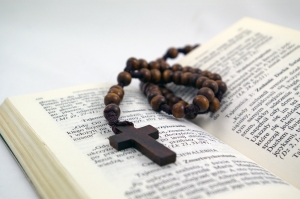Spiritual Structure: The Path to Self-Improvement
Structure, routine, habits — for good or bad, they make our lives what they are. Productive, positive, evolving; static, negative or even destructive. I, like most of us, am someone who thrives on routine, and when I can incorporate something as a habit, I am much more likely to stick with it. Trying to do a new task haphazardly or just “whenever I think of it” doesn’t work so well for this working mom who already can’t remember to put the empty shampoo bottle in the recycling bin for 3 weeks straight :).
I find that Catholicism is the most structured Christian religion I have yet to come across and I’ve been exposed to quite a few. Just what I needed! I’ve always been on a path to self-improvement and spent much time exploring and reading New Age philosophy to try and get there, but what I found in Catholicism is a very specific path, a proven path to self-improvement that has worked for countless more before me and certainly countless after me.
What do I mean by structure? Some examples… Every day there are set readings that are the same across the church that relate to the season: one Old Testament, one letter from St. Paul and one Gospel. They are carefully chosen so that the Old Testament is revealed in the New. Mass is very structured and thus comforting. Daily Mass is available to anyone who wants to grow spiritually each day; at all times you can pray in front of the Blessed Sacrament; and at our church, monthly is Eucharistic Adoration where the Blessed Sacrament is exposed for prayer and contemplation.
The Liturgy of the Hours lets you pray up to 7 times daily the same prayers that are being said worldwide by monks, priests and deacons. You’re to attend Mass weekly and on all Holy Days of Obligation; regularly confess your sins so you’re reminded of your failings and what you need to improve on. And it goes on… Structure to your days, your months and your life.
Matthew Kelly, one of my favorite Catholic authors, whose book “Rediscovering Catholicism” showed me how Catholicism is relevant to my life today, talks a lot about discipline and habit as the path to becoming “the best version of yourself.” Catholicism is a great model for what habits to develop and provides structure to help you stick to those habits.
I’ve read several articles of late that speak to how to create and maintain those habits. This article from Forbes notes how Benjamin Franklin listed 13 virtues he wanted to improve upon and set up a cycle of focusing on each one for a week. Notes the article: “In the morning he thought about how he would reinforce the new habit throughout the day. During the day he looked at his notes to remind himself of the new habit. At the end of the day, he counted how many times he fell back into the old habit.”
I think this is a great tactic so you’re not overwhelmed with working on 10 new habits at once (which I often fall prey to and fail). I’ve also read where developing a new habit takes about 3 weeks before it becomes ingrained so keep that in mind as you add new habits.
Success at developing new habits has a lot to do with willpower and focus. An article I read in the Wall Street Journal reviewing the book “Willpower: Rediscovering the Greatest Human Strength” talked about how willpower is like a muscle you have to strengthen. Try little challenges at first (can you avoid the bowl of candy at the bank?) and then move on to bigger challenges (like forgoing daily dessert).
Tomorrow, I’m going to share with you my New Year’s Spiritual Resolutions that I hope to slowly implement this year as new and productive habits.
Do you like the structure of the Catholic church? Do you find it helpful or harmful? I, for one, am hoping the church’s structure will assist me in becoming a better version of myself in 2013.





[…] share with you, in the hopes you’ll share with me, my 2013 religious resolutions! In yesterday’s blog post, I talked about ways I will try to stick to these habits and how the structure of the church helps […]
[…] While exposed to different churches growing up, I always felt most comfortable in a spiritual, but non-religious environment. I spent many years studying various New Age philosophies and always believed in God but not religion as a requirement to get to God. However, through all that, I never felt like I was given a solid, specific path to self-improvement. It was all wishy-washy, try this, do that and disorganized, so I never got very far on that path. Read my blog on Catholicism as a specific, proven path to self-improvement. […]
[…] philosophies and always believed in God but not religion as a requirement to get to God. However, through all that, I never felt like I was given a solid, specific path to self-improvement. It was all wishy-washy, try this, do that and disorganized, so I never got very far on that path. Read my blog on Catholicism as a specific, proven path to self-improvement. […]
[…] All of my life I’ve sought to grow and become the best person I can be (though I have failed miserably on that attempt over and over). After so much seeking, I eventually realized Catholicism is the best, most proven path to self-improvement. […]